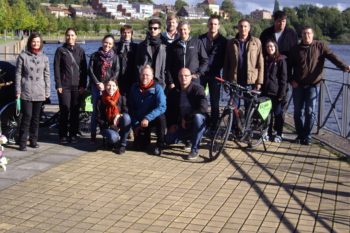Mobility
Next events View all events
Scalable Cities Roadshow P2P Event in Nea Smyrni and Kifisia (Athens), Greece – Nature, mobility, and urban sustainability: European cities towards Climate Neutrality
This in-person event will focus on scaling up energy communities as a key tool to guarantee the right to energy and enable a fair, inclusive […]
A warm welcome to Verona, Poti, Liepaja, Grand Paris Grand Est and VVSG
We are delighted to welcome 5 new members to the network
07/05/2024
Learn on innovative financing for your local energy & climate projects!
PROSPECT+, capacity building for cities & regions, launches its final call!
31/01/2024
Welcome Cascais to Energy Cities’ network!
We look forward to working with Ambiente Cascais on carbon neutrality and innovation projects
08/11/2023
One meter bicycle lane per citizen
And other tangible targets for more sustainable mobility in your city
16/10/2023
Tangible targets for cities
33 concrete goals to advance the local ecological transition
11/09/2023
Join a unique capacity-building programme on innovative financing!
H2020 PROSPECT+ is launching its third call for applications. Don’t miss the opportunity!
24/03/2023
Local organisations can receive €22,000 to support the Green Deal
Apply to get funds for your #GreenDeal initiative by 31 January
14/12/2022
Financing your energy projects: get top advice from your peers in other EU cities!
H2020 PROSPECT+ offers EU cities and regions a unique opportunity to increase their capacity on financing.
12/04/2022
Meet you climate and energy goals with reduced dependence on subsidies
Support through H2020 PROSPECT+
13/01/2022
To fight climate crisis, the EU needs at least 45% renewables target by 2030
Associations, Industries, City networks and scientists say “ YES to 45% RES”
09/12/2021
Projects All projects
SSH CENTRE EU
Social Sciences and Humanities for Climate, Energy aNd Transport Research Excellence

SSH CENTRE is a Horizon Europe project representing the cross-European Centre of Research Excellence for Climate-Energy-Mobility Social Sciences & Humanities (SSH). The project will engage […]
PROSPECT+
Capacity building for cities and regions - from learning to action!

A capacity-building programme on innovative financing, by and for EU cities and regions
CitiZEN
Sustainable Mobility for Citizens in Europe

Efficient and effective urban mobility can significantly contribute to achieving sustainable economic growth and employment opportunities in our cities. It is of huge importance to achieving the EU 2020 objectives as 70% of the EU population live in cities and account for over 80% of the EU’s GDP. Moreover, in many urban areas, the increasing demand for urban mobility has created a non-sustainable environment with severe congestion, poor air quality and high levels of CO2 emissions.













